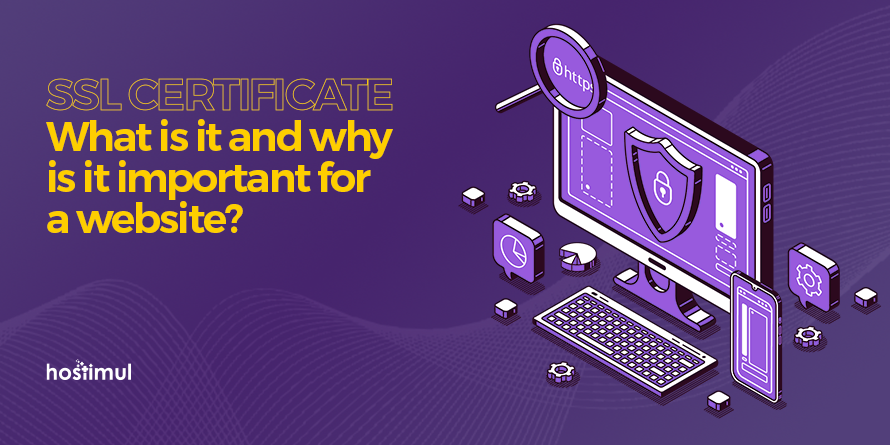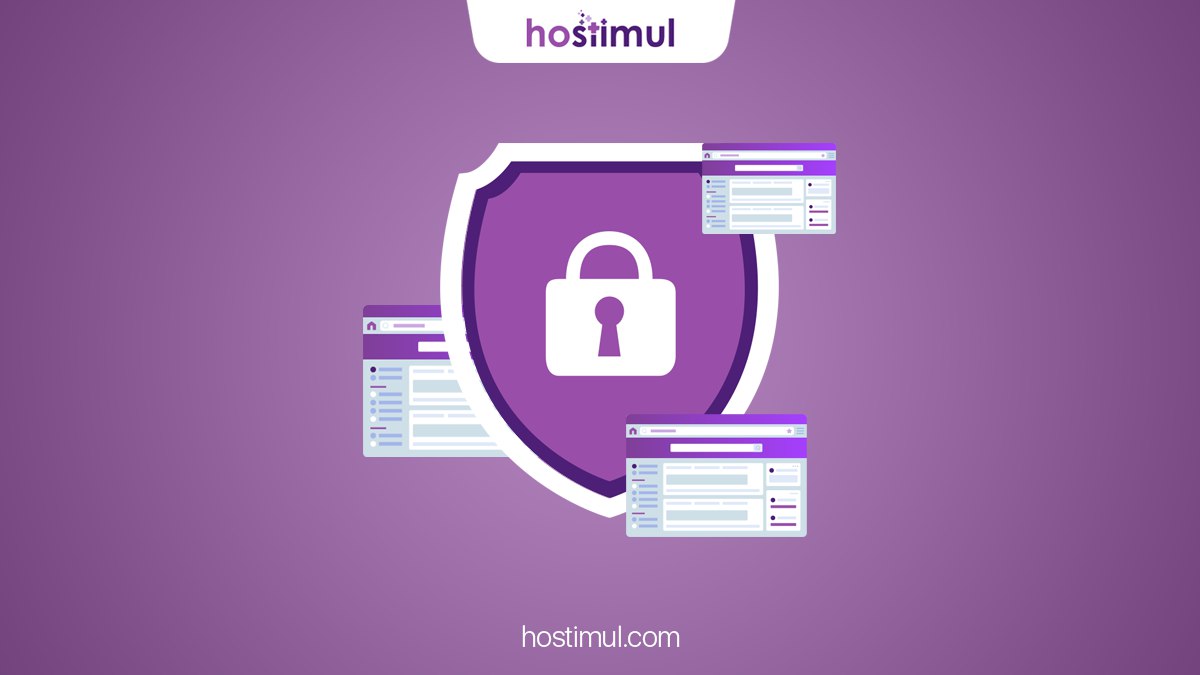What is an SSL certificate? What are the types of SSL certificates? Why is it important for hosting? You can find the answers to such questions in today's blog post.
SSL is one of the most common concepts in the Internet environment. You can often find it on shopping sites. The opening of SSL is Secure Socket Layer. We can define SSL as a security protocol developed by Netscape, which provides personal privacy and reliability, allows encryption of communication between the server and client to protect data during data transmission over the network, and thus protects privacy and integrity.
More specifically, an SSL certificate is a digital security certificate that fulfills security requirements, such as providing an encrypted connection with the user on the website and verifying the "identity" of the website. An SSL certificate ensures that information shared on a website, such as a confidential letter, reaches only the servers of the relevant website without falling into the hands of third parties. SSL certificates are a product that verifies the authenticity of site addresses and ensures the secure transmission of data communication between two points via an encrypted channel. They will never secure the code you write or your website.
An SSL certificate prevents third parties from interfering with users' important personal information, such as name, address, phone, email, and credit card or bank account information. The most important purpose of an SSL certificate is to protect the confidentiality of data. However, some SSL certificates are issued by certificate providers after authentication. This shows the reliability of the company and the website.
The security of a website on the Internet is very important for users. The confidentiality and protection of personal information and credit card information shared during the payment process is invaluable, especially on sites that work with membership systems and e-commerce sites. To understand whether a website has an SSL certificate, it is enough to pay attention to a few points.
- The first is to check the expression "HTTPS" in the URL. On an SSL-certified site, HTTPS is written instead of HTTP. The letter "s" in "HTTPS" means "safe."
- The second point to consider to make sure a website is secure is the lock icon you can see in your browser when you access the website. This lock icon can be located in different parts of the browser.
- Websites with the SSL certificate type, which provides the highest level of data encryption security, have the name of the company or organization next to the lock icon in the browser. This expression is sometimes highlighted in green.
How do SSL certificates work?
There are two keys for SSL encryption: public key and private key. SSL is based on a coding method based on the use of these keys. In fact, they are digitally coded software. What is locked with one key can only be unlocked by another key. After creating your keys (SSL does this by default, you do not need to take any action), one of the keys (private key) remains on the server. The other key (public key) is sent to the people you want to contact.
The person who wants to contact you from the outside will send you the message securely using a public key. Your personal key will be required to decrypt, even if the information was obtained before it reached you during the transfer.
SSL ensures that data transmitted between users and websites or between two systems is not read in any way. It uses encryption algorithms to complicate the transmission of data, thus preventing hackers from reading the information sent over the connection. This data may include sensitive information such as names, addresses, credit card numbers or other financial information.
The process takes place more precisely as follows:
1) A browser or server tries to connect to an SSL-protected website (ie, a web server).
2) The browser or server asks the webserver to recognize itself.
3) In response, the webserver sends a copy of the SSL certificate to the browser or server.
4) The browser or server checks it to decide if it trusts the SSL certificate. If it trusts the certificate, it sends a signal to the webserver accordingly.
5) The web server then responds with a digitally signed authentication to start the SSL encrypted session.
6) Encrypted data is shared between the browser or server and the webserver. This process is sometimes called "SSL handshake". Although this may seem like a long process, it happens in milliseconds.
What are the Features of the SSL Protocol?
- Provides security and confidentiality when encrypting and decrypting incoming data.
- Makes it easy to create a document archive.
- The connection is valid. It also includes checking the integrity of the message during the message flow.
- Ensures that the sender and receiver are in the right places.
- Checks the date and time of sent documents.
Which browsers support the SSL protocol?
Modern web browsers such as Chrome, Safari, Internet Explorer, Mozilla Firefox, Opera support SSL Protocol. The best-selling SSL Certificates are brands such as Comodo SSL, Rapid SSL, Thawte, Symantec, Certum.
Is there a connection between SSL Certificate and SEO?
SSL certification is one of the SEO criteria defined by Google. This way, your site can meet Google criteria and rise in rankings. However, an SSL certificate alone will not be enough to increase your site's ranking. SEO criteria are taken into account in the optimization work, taking into account the security of both the user and the site. The question may be: Does the SSL certificate affect the ranking in the search engine? The impact of SSL certification on rankings should not be underestimated by the impact of web browsers, especially Google Chrome. When users search using certain keywords, they tend to visit the sites listed on the first page. If the site they are looking for does not have an SSL certificate installed, the browser will automatically notify the user. In this case, users prefer safer options instead of registering or continuing to fill out forms. This way, secure websites get more traffic than others. Therefore, it outperforms its competitors who do not use certificates in search results. SSL takes the user experience to a higher level, helping the website that represents your brand in the search engine rankings to be one step ahead of your competitors and appear on the front page. By offering a safer environment to your customers or members through your website, you can easily increase their trust in you. As a result, an SSL certificate, which is very easy to install, makes your website more secure and allows your target audience to choose you first and foremost to meet their needs. In addition to achieving this result, it also contributes to the rise of your website in search results, which will allow you to promote your business or ideas.
Other places where SSL certificates are used:
Millions of websites (including blogs and social media sites); uses SSL to secure credit card transactions, data transfer and secure browsing of login pages. By enabling HTTPS, you are informing consumers that the website is legitimate and safe to operate.
SSL is most commonly used for security:
- Online credit card transactions
- Web forums and customer logins
- Email and webmail programs
- Corporate communication through intranets, file sharing, extranets and internal servers
- Cloud-based platforms and virtualized applications
- File transfer via FTP
- Data transfer from mobile devices and devices
What are the types of SSL Certificates?
There are many types of SSL certificates available today, depending on the level of authentication and the number of domains they provide.
According to the level of authentication, SSL certificates are as follows:
1. Validated SSL domain
Domain Validated (DV) SSL certificate provides the lowest level of authentication. The main purpose of DV certificates is to provide a connection between the domain's web server and the browser.
2. Organization validated SSL
The OV SSL certificate requires intermediate verification if it controls the organization's domain and access rights to the organization's information. OV certification increases the level of trust of the organization and the domain name.
3. Extended Validated
EV SSL certification requires a high level of verification. This includes checking for legal, physical, and operational availability.
SSL certificates for domain names are:
1. Single Domain SSL (Standard SSL Certificates) - Standard SSL Certificates provide a fully qualified domain or subdomain.
2. Wildcard SSL Certificate - Wildcard SSL Certificate covers a domain name and an unlimited number of subdomains.
3. Multi-Domain SSL Certificate - A Multi-Domain SSL certificate protects multiple domains using the same certificate. It is specifically designed to secure Microsoft Exchange and Office Communications environments.
How to add an SSL certificate to your website?
Installing an SSL certificate depends on how and where your website is hosted. There are usually several ways to add an SSL certificate to your server. In most cases, your hosting provider will automatically add an SSL certificate to your website (probably with a Domain Validated certificate). If your organization needs a more secure SSL certificate, you can consult your hosting provider or IT security team.
Get your SSL certificate from us!
Hostimul offers SSL certificates provided by the most reliable companies in the field of online security (RapidSSL, GeoTrust, Symantec). Also, if you receive a new SSL certificate from us, we will add a maximum of 12 months free of charge to the remaining period of your current SSL certificate. Log in to our site now and choose the SSL package that suits your needs.



